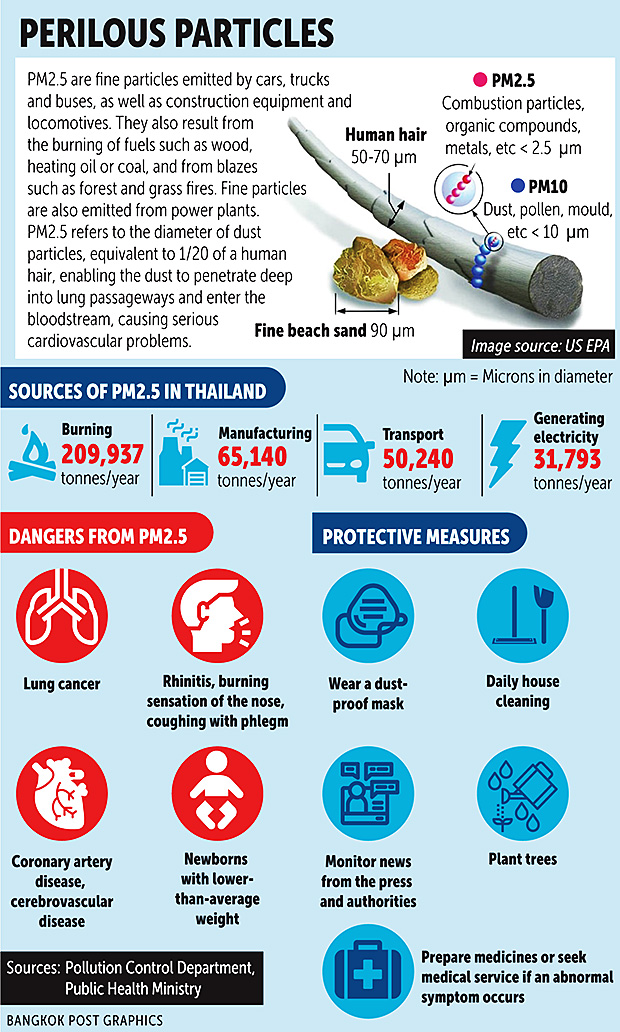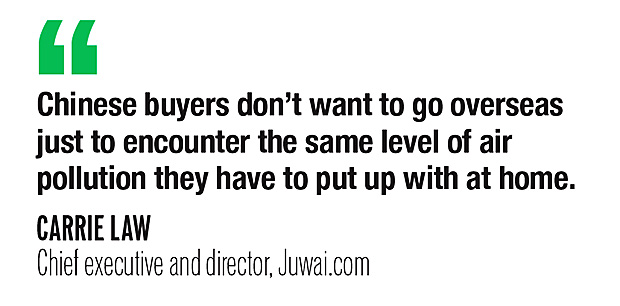
Smiles in Bangkok are beginning to fade as fears of the perilous PM2.5 particles prompt people to cover their faces with dust masks or risk a host of illnesses.
Thailand's capital has long been associated with air pollution and smog, but the air quality is getting worse as the capital has been troubled by accumulated fine particulate matter with a diameter of less than 2.5 micrometres for many weeks.
PM2.5 has exceeded the safety limit of 50 microgrammes per cubic metre in many districts during the past few weeks.

Exposure to PM2.5 has been found to cause short-term adverse health effects such as eye, nose, throat and chest irritation, as well as being linked to long-term health conditions such as asthma and cardiovascular disease.
Construction projects and emissions from cars are major contributors to air pollution, while a lack of wind has allowed pollution to accumulate in the air, according to the Pollution Control Department.
While it's obvious that these particles are the cause of health problems, greater attention has to be paid to potential economic losses and resolutions by the business sector, which has contributed to the ongoing haze via manufacturing and construction.
LOWER EMISSIONS NEEDED
The initial economic loss from the fine dust fouling the air in Bangkok and surrounding areas is estimated at 2.6 billion baht or more, according to Kasikorn Research Centre (K-Research).
The loss estimate is based on opportunity cost from the haze's impact on health and tourism.

Pedestrians wear dust masks as they walk along a busy street in Bangkok. NATTAPOL LOVAKIJ
The initial increase in healthcare cost arising from the dust pollution is estimated at 1.6-3.1 billion baht for at least 50% of the roughly 2.4 million people living in Bangkok who suffer from allergies.
K-Research estimates the initial opportunity cost for tourism at 1-3.5 billion baht, representing 2.5-4.5% of tourism income contributed by Bangkok.
The forecast is based on assumptions that 1-2% of foreign tourists avoid Bangkok, that those who cannot change plans shift to travel in areas free from dust pollution, and that the duration of the dust problem is less than one month starting from late last year.
The habit of using private vehicles instead of public transport is one of the main culprits of the hazy atmosphere in Bangkok.
Just 21% of Bangkokians use public transport to commute, said Sumet Ongkittikul, research director for transport and logistics policy at the Thailand Development Research Institute (TDRI).
There are about 150,000 vehicles in Bangkok with a 20-year usage, while 180,000 cars have been used for over 15 years, contributing to pollution emissions, Mr Sumet said.
The state should revise its tax policy by imposing higher tax on vehicles producing dangerous emissions, promote the use of eco-friendly cars and incentivise the use of public transport, he said.
Urging people to commute by public transport could be done by limiting the number of private vehicles going into downtown areas, Mr Sumet said.
"It has to be admitted that it is difficult to impose charges on vehicles entering congested zones, but we could opt to control urban car parks to encourage people not to drive into downtown areas, since traffic automatically becomes congested whenever a mall has parking spaces for 2,000 cars," he said.
Prohibiting cars from parking on every road between 5am and 9pm could be another solution to reduce pollution in Bangkok, Mr Sumet said.
Chumnong Sorapipatana, a board member of the Asian Transportation Research Society, said substandard construction of urban electric trains contributes to worsening dust particles.
Construction should only be done at night and pillars erected at some electric train construction sites should not block traffic in order to prevent worsening traffic congestion, said Assoc Prof Chumnong.
HIGHER FUEL STANDARD
The Federation of Thai Industries (FTI) admits that the massive number of vehicles on roads is the key factor exacerbating the pollution problem in Bangkok and surrounding areas, as they are the root cause of emitting hazardous emissions, notably carbon dioxide and carbon monoxide.
In 2018, there were 39.55 million vehicles registered with the Land Transport Department. Of these, 20.9 million were motorcycles, 16.4 million were identified as passenger cars, executive vans and pickups, with other types of vehicles accounting for the rest.
There were 1.287 million trucks and buses registered with the department last year. Breaking down the figures, 1.112 million were registered as heavy- and medium-duty trucks, while 162,975 were fixed route, non-fixed route and private buses.

Primary school students rally on Rama I Road as part of the Bangkok Metropolitan Administration’s campaign to raise awareness about air pollution. SOMCHAI POOMLARD
There were only 1,454 units classified as 100% electric vehicles with zero emissions. Of these, 1,110 units were electric motorcycles, while 138 were electric passenger cars and 85 were electric buses, with other types of vehicles making up the rest.
The FTI's automotive industry club is calling for the department under the Transport Ministry to take more serious action on the matter.
"The top priority is to inspect black smoke released from trucks and buses," said club spokesman Surapong Paisitpatanapong. "The department's officials inspect occasionally, not rigorously."
He said trucks and buses normally release black smoke with higher emissions than other vehicles because they have been used for a long period, with some having been used for more than 20 years.
"Old diesel engines always release higher emissions than new vehicles," Mr Surapong said.
Trucks and buses are currently compatible with Euro 3 diesel, a stage of the European emission standards, unlike other vehicles that have already been upgraded to Euro 4 or above.
The Energy Ministry is in talks with six oil refinery operators in Thailand to examine the possibility of upgrading refined oil to meet the Euro 5 standard.
The higher Euro fuels mean fewer emissions released, thereby improving air quality.
Nantika Thangsuphanich, director-general of the Energy Business Department, said the Euro 5 standard is a long-term measure to improve Thailand's air quality from the current Euro 3 and 4 standards.
"It will take time to prepare for the Euro 5 standard because oil companies need capital expenditure to upgrade production facilities, so this cannot be implemented immediately," Ms Nantika said.
The Euro standards measure the quantity of substances such as dust, sulphur, ozone and polyaromatic hydrocarbons emitted by engines.
For instance, under the Euro 5 standard, sulphur level is set at 10 parts per million (PPM), compared with 50 PPM under Euro 4.
The upgrade to Euro 4 began in 2012 and will be fully implemented by 2022, costing refiners 10 billion baht in investment. Euro 5 may require 30 billion baht worth of investment, Ms Nantika said, adding that the figure could raise retail oil prices by 0.50-1 baht per litre.
B20 BIODIESEL
According to the Energy Ministry's report, three oil refiners, namely Bangchak Corporation Plc, Thai Oil Plc and PTT Global Chemical Plc, are ready for the Euro 5 standard, while the other three companies, Esso Thailand, IRPC Plc and Star Petroleum Refining Plc, are not prepared.
Hong Kong and Japan are currently the only jurisdictions in Asia to implement the Euro 5 standard.
But the urgent issue from the country's energy policymakers is to speed up the enforcement of biodiesel B20, which can reduce diesel emissions from the current B7 biodiesel, which is blended with 7% methyl ester in combination with high-speed diesel.
B20 biodiesel will increase to 20% content of methyl ester from crude palm oil.

Energy Minister Siri Jirapongphan said policymakers are preparing B20 biodiesel to be ready for pickup and truck assemblers, as well as oil traders, with the objective of using B20 biodiesel on a large scale in the near future.
But B20 biodiesel remains in a trial period of use for the fleet of big trucks, public buses, express boats and agricultural machinery, with stakeholders voicing concerns that B20 will pose problems for diesel engines.
Apart from the proposed solutions for trucks and buses, Mr Surapong from the FTI said many related government agencies should issue some financial measures to encourage motorists to replace their cars and motorcycles after being used for more than seven years.
He said most Thais use their vehicles for longer than seven years, therefore state agencies can provide a tax rebate programme of vehicle replacement for motorists.
"The [auto] industry used to see 1.45 million and 1.33 million cars sold during the government's first-time car buyer scheme," Mr Surapong said. "State agencies can apply this programme to existing motorists. The club strongly believes that the tax rebate scheme can yield success to roll out new cars on the roads that release fewer emissions than the older ones."
Ninnart Chaithirapinyo, chairman of the board at Toyota Motor Thailand, said the auto giant aims to set up a new working group with the government to solve the problem in a sustainable way.
"Toyota also agrees to use biodiesel B20 in pickups that have already been developed for B20 compatibility," he said.
TIGHTENED CONTROL
The property sector can help reduce dust particles by applying more prefabricated construction materials and strictly complying with all related regulations, according to property developers and consultants.
Issara Boonyoung, honorary president of the Housing Business Association, said the use of prefabrication can help minimise dust and construction waste at sites, as prefabrication can replace many wet-trade activities.
"Wet-trade activities, such as blockwork, brickwork, concrete, grout, masonry, and mortar and plastering, generate dust," he said. "Using prefabrication can save the environment because dust particles from construction are larger than PM2.5."
Many low-rise residential, single-house and townhouse projects have applied prefabricated construction materials. Roads in these property projects are also made from ready-mix concrete, which produces less dust than mixing concrete on site.
At high-rise property projects, prefabrication is now being applied for some parts. For projects using conventional construction methods, contractors should wet and clean construction sites more frequently to reduce dust from cast in situ and other activities.
"Most contractors currently comply with building regulations controlled by an environmental impact assessment and the local authority," Mr Issara said. "If everyone complies with the rules strictly, the property sector can help minimise pollution."
However, avoiding construction during the dry season is difficult because it's the seasonal period of construction.
"Related government agencies like the Bangkok Metropolitan Administration should control the rules more seriously, like monitoring trucks carrying sand, soil and stones to have good covers and don't overload items," Mr Issara said.
Though Bangkok's air pollution is likely to have a minimal effect on Thai attitudes towards property purchases, foreign buyers may think differently, particularly Chinese.
The Chinese have been interested in buying Bangkok condos since 2016. Last year, Bangkok led all other global property investment destinations in terms of Chinese buyer interest.
Carrie Law, chief executive and director of Juwai.com, a Chinese international property portal, said there are long-term threats to Bangkok's appeal, especially the high level of air pollution seen recently.
"Chinese buyers don't want to go overseas just to encounter the same level of air pollution they have to put up with at home," Ms Law said.